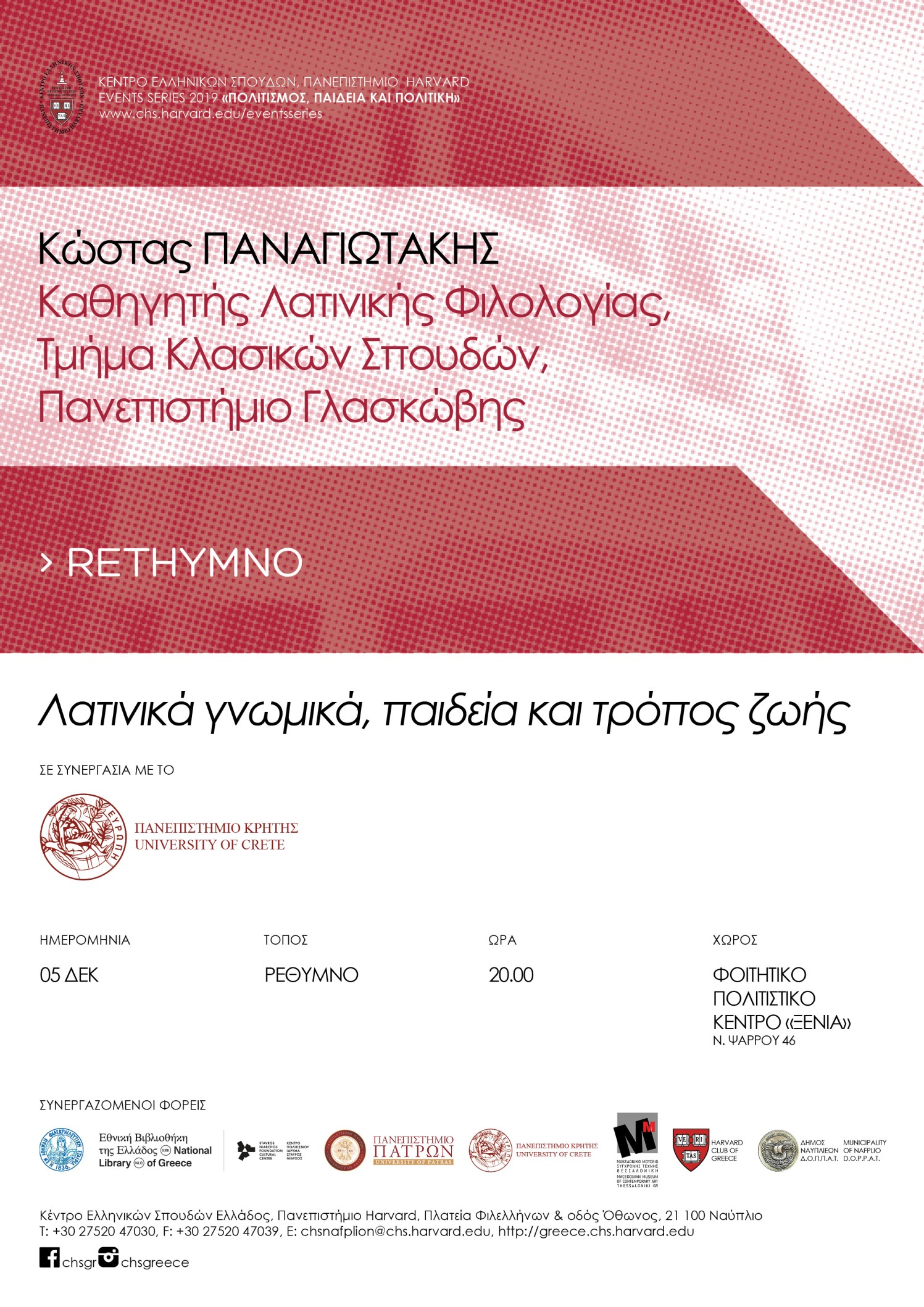Events Series 2019
Click here for the English version
Εκδήλωση ΚΕΣ
Με χαρά σας προσκαλούμε την Τετάρτη 5 Δεκεμβρίου, 2018, στις 20:00, στη διάλεξη με θέμα:
«Λατινικά γνωμικά, παιδεία και τρόπος ζωής»
Ομιλητής: Κώστας Παναγιωτάκης, Kαθηγητής Λατινικής Φιλολογίας, Τμήμα Κλασικών Σπουδών, Πανεπιστήμιο Γλασκώβης
Η εκδήλωση θα λάβει χώρα στο Φοιτητικό και Πολιτιστικό Κέντρο «Ξενία» στο Ρέθυμνο. Η ομιλία θα γίνει στα Ελληνικά.
Η εκδήλωση πραγματοποιείται σε συνεργασία με το Πανεπιστήμιο Κρήτης.
Περισσότερες πληροφορίες σχετικά με το πρόγραμμα Events Series μπορείτε να βρείτε στον σύνδεσμο: www.chs.harvard.edu/eventsseries
Σύνοψη της διάλεξης
Η πολιτιστική κληρονομιά της Ρώμης είναι διάχυτη στις μέρες μας· την βρίσκουμε στη γλώσσα που μιλάμε, στα λογοτεχνικά κείμενα που διαβάζουμε, στα έργα τέχνης που θαυμάζουμε και στην αρχιτεκτονική που μας περιβάλλει, στους νόμους που ρυθμίζουν την ζωή μας, στην τεχνολογία που χρησιμοποιούμε και στα δημοφιλή θεάματα που μας διασκεδάζουν. Βεβαίως οι Ρωμαίοι μάς είναι γνωστοί όχι μόνο για τα επιβλητικά τους μνημεία αλλά και για τη σπουδαία τους λογοτεχνία, μέρος της οποίας αποτελούν σύντομες, περιεκτικές και αλησμόνητες φράσεις, όπως “η τύχη ευνοεί τους γενναίους” του Τερεντίου, “άδραξε τη μέρα” του Ορατίου, “ο έρωτας κατακτά τα πάντα” και “συνεχώς άστατο και ευμετάβλητο πλάσμα η γυναίκα” του Βιργιλίου, “νους υγιής εν σώματι υγιεί” του Ιουβενάλη, και πολλά άλλα. Η ομιλία μου θα εστιάσει σε τέτοιου είδους αποφθέγματα και συγκεκριμένα θα εξετάσει το αρχικό τους περιεχόμενο, πώς αυτό άλλαξε κατά την επιβίωσή τους και πώς τέτοια αποφθέγματα επηρέασαν την ευρωπαϊκή σκέψη και την καλλιτεχνική παράδοση.
Σύντομο βιογραφικό σημείωμα του Κώστα Παναγιωτάκη
 Ο Κώστας Παναγιωτάκης είναι Καθηγητής Λατινικής Φιλολογίας στο Πανεπιστήμιο της Γλασκώβης. Ασχολείται ερευνητικά με το μυθιστόρημα και το θέατρο και ειδικότερα με τα Σατυρικά του Πετρωνίου και με αποσπασματικά σωζόμενες μορφές λαϊκού θεάτρου (τους λογοτεχνικούς μίμους του Δέκιμου Λαβέριου και του Ποπλιλίου καθώς και τη λεγόμενη Ατελλανή κωμωδία). Κύριες δημοσιεύσεις του στα θέματα αυτά αποτελούν οι μονογραφίες Theatrum Arbitri: Theatrical Elements in the Satyrica of Petronius (Leiden, 1995) και Decimus Laberius: The Fragments (Cambridge, 2010). Ο Κ. Παναγιωτάκης έχει μεταφράσει στα ελληνικά κωμωδίες του Πλαύτου και του Τερεντίου και (μαζί με τον αδελφό του Στέλιο) την κλασική μελέτη του Πήτερ Ουώλς Η Ρωμαϊκή Μυθιστορία: Τα Σατυρικά του Πετρωνίου και οι Μεταμορφώσεις του Απουληίου (ΜΙΕΤ 2000). Ετοιμάζει νέες κριτικές εκδόσεις, με μετάφραση και σχόλια, των αποσπασμάτων της Ατελλανής κωμωδίας, των γνωμικών που αποδίδονται στον μιμογράφο Ποπλίλιο και του επεισοδίου από τα Σατυρικά του Πετρωνίου που είναι γνωστό ως “Το Δείπνο του Τριμαλχίωνα” (Cena Trimalchionis).
Ο Κώστας Παναγιωτάκης είναι Καθηγητής Λατινικής Φιλολογίας στο Πανεπιστήμιο της Γλασκώβης. Ασχολείται ερευνητικά με το μυθιστόρημα και το θέατρο και ειδικότερα με τα Σατυρικά του Πετρωνίου και με αποσπασματικά σωζόμενες μορφές λαϊκού θεάτρου (τους λογοτεχνικούς μίμους του Δέκιμου Λαβέριου και του Ποπλιλίου καθώς και τη λεγόμενη Ατελλανή κωμωδία). Κύριες δημοσιεύσεις του στα θέματα αυτά αποτελούν οι μονογραφίες Theatrum Arbitri: Theatrical Elements in the Satyrica of Petronius (Leiden, 1995) και Decimus Laberius: The Fragments (Cambridge, 2010). Ο Κ. Παναγιωτάκης έχει μεταφράσει στα ελληνικά κωμωδίες του Πλαύτου και του Τερεντίου και (μαζί με τον αδελφό του Στέλιο) την κλασική μελέτη του Πήτερ Ουώλς Η Ρωμαϊκή Μυθιστορία: Τα Σατυρικά του Πετρωνίου και οι Μεταμορφώσεις του Απουληίου (ΜΙΕΤ 2000). Ετοιμάζει νέες κριτικές εκδόσεις, με μετάφραση και σχόλια, των αποσπασμάτων της Ατελλανής κωμωδίας, των γνωμικών που αποδίδονται στον μιμογράφο Ποπλίλιο και του επεισοδίου από τα Σατυρικά του Πετρωνίου που είναι γνωστό ως “Το Δείπνο του Τριμαλχίωνα” (Cena Trimalchionis).


Events Series 2019
CHS GR Event
Please join us on Wednesday, December 5, 2018 at 8:00 p.m., in Rethymno for the lecture:
“Latin sayings, culture and lifestyle”
Lecturer: Costas Panayotakis, Professor of Latin in the Classics Department at the University of Glasgow
The event will be held at the Student Cultural Center “Xenia” in Rethymno. The lecture will be delivered in Greek.
The event is organized in collaboration with the University of Crete.
Learn more about the Events Series by following the link: www.chs.harvard.edu/eventsseries
Synopsis of the lecture
The cultural legacy of the Romans is all around us, in the language we speak, the literature we read, the art we admire and the architecture we appreciate, the legal system within which we operate, the technology we use, the popular entertainment we enjoy. The Romans are, of course, known to us not only because of their impressive large-scale monuments but also through their remarkable literature, which includes short, pithy, and memorable phrases, such as Terence’s “fortune favours the brave”, Horace’s “seize the day”, Virgil’s “love conquers all” and “woman is constantly a fickle and changeable creature”, Juvenal’s “a healthy mind in a healthy body”, to name but a few. My talk will focus on what celebrated sayings such as these meant in their original context, how their meaning changed during their reception, and how they influenced the artistic and intellectual culture of subsequent eras in Europe.
Costas Panayotakis’ brief resume
 Costas Panayotakis is Professor of Latin at the University of Glasgow. His research focusses on the novel and comic drama, especially Petronius’ Satyrica and the popular low forms of Roman theatrical entertainment (the mimes of Decimus Laberius and Publilius and the so-called Atellane comedy), the scripts of which have come down to us only in fragments. His main publications in these scholarly areas are his books Theatrum Arbitri: Theatrical Elements in the Satyrica of Petronius (Leiden, 1995) and Decimus Laberius: The Fragments (Cambridge, 2010). He has also translated into Modern Greek select plays of Plautus and Terence and (with his brother Stelios) Peter Walsh’s influential study on The Roman Novel: The Satyricon of Petronius and the Metamorphoses of Apuleius (Cultural Foundation of the National Bank of Greece, 2000). He is currently preparing new critical editions (with facing translation and commentary) of the fragments of Atellane comedy, the moral maxims associated with the mimographer Publilius, and Petronius’ ‘Dinner at Trimalchio’s’.
Costas Panayotakis is Professor of Latin at the University of Glasgow. His research focusses on the novel and comic drama, especially Petronius’ Satyrica and the popular low forms of Roman theatrical entertainment (the mimes of Decimus Laberius and Publilius and the so-called Atellane comedy), the scripts of which have come down to us only in fragments. His main publications in these scholarly areas are his books Theatrum Arbitri: Theatrical Elements in the Satyrica of Petronius (Leiden, 1995) and Decimus Laberius: The Fragments (Cambridge, 2010). He has also translated into Modern Greek select plays of Plautus and Terence and (with his brother Stelios) Peter Walsh’s influential study on The Roman Novel: The Satyricon of Petronius and the Metamorphoses of Apuleius (Cultural Foundation of the National Bank of Greece, 2000). He is currently preparing new critical editions (with facing translation and commentary) of the fragments of Atellane comedy, the moral maxims associated with the mimographer Publilius, and Petronius’ ‘Dinner at Trimalchio’s’.

